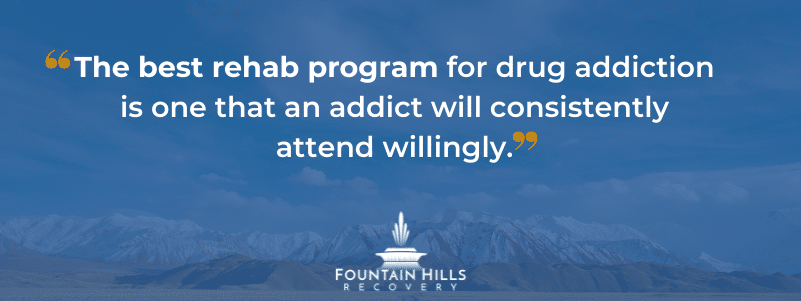When discussing rehab, people can become quite defensive – be it the addict or a family member who doesn’t think it’ll work.
But what goes into rehabilitation programs is on full display for addicts and their families so that there are no surprises, and it’s clear how it brings about real success stories for those struggling with addiction.
In this guide to effective treatment for substance abuse, we’ll cover:
- Who is considered a drug addict?
- What do I do if my family member is addicted to drugs?
- Which is the best rehab program for drug addiction?
- What is it like to attend rehab?
- Does rehab work?
Who is Considered a Drug Addict?
Substance abuse or drug addiction is a disease that affects a person’s behavior and leads to an inability to control the use of a drug or medication. This includes substances such as alcohol, marijuana, or prescription medication.
Drug addiction can start with social situations, recreational use, or normal prescriptive use. Drug addiction might affect people more overtly than others, and there is no set time for drug addiction to develop. Depending on the drug type and that person’s individual risk, some people may become addicted more quickly than others.
Similarly, the response to intervention and treatment may vary based on each person and their respective addiction. While that means there are no one-size-fits-all solutions to help our friends, family, and loved ones, we must be diligent in getting them the best help available as soon as possible.
What Percentage of People Have a Drug or Alcohol Addiction?
According to the National Survey on Drug Use and Health (NSDUH), over 20 million Americans ages 12+ suffer from substance use disorder.
This means that approximately 10 percent of U.S. adults (over the age of 12) have a drug use disorder.
Additionally, of those substance use disorders, nearly 75% of them are alcohol related.
Drug and alcohol addiction costs the United States nearly one trillion dollars each year, but the highest costs are the lives of the affected addicts and their families surrounding them.
What do I do if My Family Member is Addicted to Drugs?
It can be scary to see drugs or alcohol take hold of our loved ones. It can be even more difficult if they are in denial about the substance abuse problem. However, it is important to remember that they are not doomed, and you can help them get the proper resources to recover.
When helping a loved one who is addicted to drugs, you should:
- Stop enabling them financially or by being codependent.
- Organize a professional intervention if necessary.
- Set boundaries that encourage rapid change in their life.
- Follow through with consequences.
- Pursue inpatient or outpatient treatment for your loved ones.
Keep in mind that shame, blame, and anger are not effective ways of communicating with someone who is addicted to drugs. Neither is engaging with them while they are under the influence. You must be persistent and show them that there are ways they can make a change for the better, even if it is difficult in the short term.
Which is the Best Rehab Program for Drug Addiction?
The best rehab program for drug addiction is one that an addict will consistently attend willingly. In terms of format, which will largely depend on their life circumstances and how severely the effects of addiction are harming them.

When choosing a rehab program, we recommend researching the different inpatient and outpatient facilities that fit your loved one’s current lifestyle and budget and following experts’ recommendations who can help guide you through entering rehab.
What is it Like to Attend Rehab?
There are many different rehab facilities to choose from, but the best treatment centers focus on providing effective treatment in compassionate ways.
Read More: How to Help an Addict in Denial
There are inpatient and outpatient facilities and different programs for addicts at various points in their recovery.
What are Inpatient Treatments?
Inpatient Facilities are designed to house residents seven days a week with structured, intensive programs. There is personalized care using evidence-based therapies and sub-acute detox programs. These facilities allow patients to focus on mental well-being, reconnect with other people, and build support networks.
What are Outpatient Addiction Programs?
Outpatient Programs are meant to operate on trust and the unique circumstances of each patient but still provide intensive rehabilitation. These programs are ideal for patients who cannot commit to full-time residential treatment or are at a place where they can continue to work, attend school, and go about daily life during the recovery process.
Regardless of the dynamic, attending rehab must be a choice that an addict makes for themselves.
Does Rehab Work?
While the outcome for each patient will vary, research has shown that treating substance abuse disorders through treatment is effective. It is important to understand that recovery isn’t necessarily linear, and relapse and recurrence of use do not constitute failure.

One of the most essential elements of rehab programs is changing the mentality of an addict so that they realize they need help and are consistently trying to improve. Even progress that seems small, like more time in between relapses, shows growth and effort.
How Long Can a Patient Stay in Drug Rehab?
The general length of many inpatient programs is in 30-day increments, but drug rehab is a life-long, ongoing process. The specific structured programming that you or your loved one receives depends on the facility or treatment you choose.
When discussing potential treatments with doctors, clinicians, and psychotherapists, it is important to recognize that rehab programs ideally end when progress is made, and it doesn’t adhere to a set period of time. This mindset will help you and your loved ones have the best chance of a successful rehabilitation and recovery journey.
Fountain Hills Recovery is Arizona’s Premier Addiction Treatment Center
At Fountain Hills Recovery, we know that addiction affects people of all different types. This is why we believe it is vital to have experts and treatment programs to provide the proper individual care to anyone trying to turn their life around.
If you are looking to take the next step to get you or your loved one on a path to recovery, please get in touch with us immediately.





